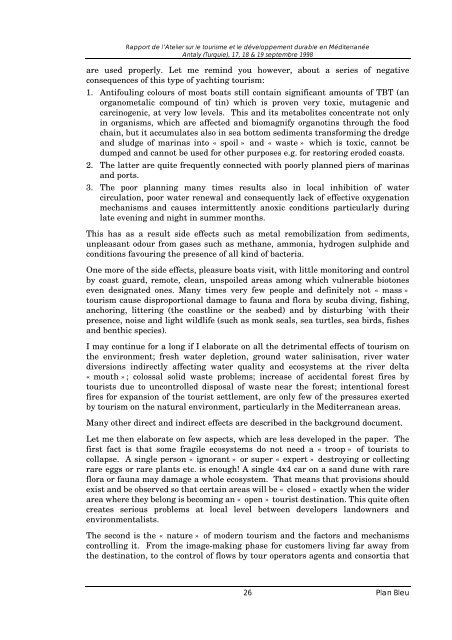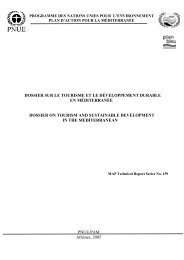MEDITERRANEAN ACTION PLAN
MEDITERRANEAN ACTION PLAN
MEDITERRANEAN ACTION PLAN
Create successful ePaper yourself
Turn your PDF publications into a flip-book with our unique Google optimized e-Paper software.
Rapport de l’Atelier sur le tourisme et le développement durable en Méditerranée<br />
Antaly (Turquie), 17, 18 & 19 septembre 1998<br />
are used properly. Let me remind you however, about a series of negative<br />
consequences of this type of yachting tourism:<br />
1. Antifouling colours of most boats still contain significant amounts of TBT (an<br />
organometalic compound of tin) which is proven very toxic, mutagenic and<br />
carcinogenic, at very low levels. This and its metabolites concentrate not only<br />
in organisms, which are affected and biomagnify organotins through the food<br />
chain, but it accumulates also in sea bottom sediments transforming the dredge<br />
and sludge of marinas into « spoil » and « waste » which is toxic, cannot be<br />
dumped and cannot be used for other purposes e.g. for restoring eroded coasts.<br />
2. The latter are quite frequently connected with poorly planned piers of marinas<br />
and ports.<br />
3. The poor planning many times results also in local inhibition of water<br />
circulation, poor water renewal and consequently lack of effective oxygenation<br />
mechanisms and causes intermittently anoxic conditions particularly during<br />
late evening and night in summer months.<br />
This has as a result side effects such as metal remobilization from sediments,<br />
unpleasant odour from gases such as methane, ammonia, hydrogen sulphide and<br />
conditions favouring the presence of all kind of bacteria.<br />
One more of the side effects, pleasure boats visit, with little monitoring and control<br />
by coast guard, remote, clean, unspoiled areas among which vulnerable biotones<br />
even designated ones. Many times very few people and definitely not « mass »<br />
tourism cause disproportional damage to fauna and flora by scuba diving, fishing,<br />
anchoring, littering (the coastline or the seabed) and by disturbing 'with their<br />
presence, noise and light wildlife (such as monk seals, sea turtles, sea birds, fishes<br />
and benthic species).<br />
I may continue for a long if I elaborate on all the detrimental effects of tourism on<br />
the environment; fresh water depletion, ground water salinisation, river water<br />
diversions indirectly affecting water quality and ecosystems at the river delta<br />
« mouth » ; colossal solid waste problems; increase of accidental forest fires by<br />
tourists due to uncontrolled disposal of waste near the forest; intentional forest<br />
fires for expansion of the tourist settlement, are only few of the pressures exerted<br />
by tourism on the natural environment, particularly in the Mediterranean areas.<br />
Many other direct and indirect effects are described in the background document.<br />
Let me then elaborate on few aspects, which are less developed in the paper. The<br />
first fact is that some fragile ecosystems do not need a « troop » of tourists to<br />
collapse. A single person « ignorant » or super « expert » destroying or collecting<br />
rare eggs or rare plants etc. is enough! A single 4x4 car on a sand dune with rare<br />
flora or fauna may damage a whole ecosystem. That means that provisions should<br />
exist and be observed so that certain areas will be « closed » exactly when the wider<br />
area where they belong is becoming an « open » tourist destination. This quite often<br />
creates serious problems at local level between developers landowners and<br />
environmentalists.<br />
The second is the « nature » of modern tourism and the factors and mechanisms<br />
controlling it. From the image-making phase for customers living far away from<br />
the destination, to the control of flows by tour operators agents and consortia that<br />
26<br />
Plan Bleu
















